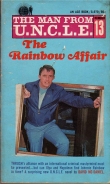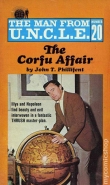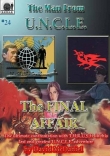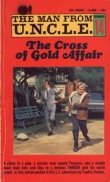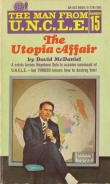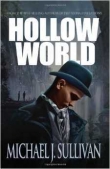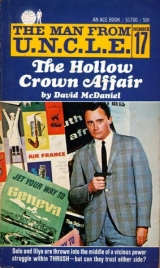
Текст книги "The Hollow Crown Affair "
Автор книги: David McDaniel
Жанры:
Боевики
,сообщить о нарушении
Текущая страница: 1 (всего у книги 8 страниц)
The Hollow Crown Affair
By David McDaniel
DECEASED—LINE OF DUTY
UNCLE's dossier on Joseph King said their former Lab Chief had been killed during a field test of his new Particle Accelerator Rifle, a very deadly new weapon that backfired on him. There was no doubt about his death or the circumstances.
But could he somehow have escaped from the explosion and defected to THRUSH, taking the secrets of that weapon with him? Could he now be fighting treacherously for a position of power in THRUSH, using the P.A.R. against his rivals?
The head of THRUSH's San Francisco satrap claimed that was true, and he had voluntarily walked into UNCLE Headquarters to ask for help against King. Obviously UNCLE had to act—but Napoleon and Illya knew they would be facing sudden death from all sides.
"For within the hollow crown
That rounds the mortal temples of a king
Keeps Death his court..."
—Richard II, Act III Scene II 160-162
Del Floria looked up from his presser as the bell above his shop door tinkled and stared at the gentleman who entered. From the crown of his black homburg to the ferrule of his silver-topped cane stood six feet of aristocratic hauteur, piercing eyes above a well-kept beard, with an erect, almost military stance marred by the awkward angle of one leg.
"Good afternoon, Mr. Floria," said the total stranger. His voice was somewhat harsh, but carefully trained. He stumped clumsily down the four steps into the shop and crossed directly to the second fitting booth. At the curtain he paused and turned. "Well, push your lever, my good man! I wish to see Alexander Waverly."
Del stared at him. "I beg your pardon?" he said doubtfully. "If you're looking for the apartment house, that's a couple doors east at 320. Nobody named Waverly here."
"Don't be impertinent. Time is too short for me to go through that nonsense at the Masque Club. Where's your television camera?"
Del stammered as the man glanced around the wall molding and faced a barely-visible lens. "There was no opportunity for me to make an appointment, Waverly. If you are to take action at all, you must begin at once."
He took two quick steps towards Del and his can licked out to tap the steam lever twice. Then he turned back and through the curtain, twisted the coathook and stepped into the fluorescent blue light and steel walls of Inner Reception Station Three, just as a concealed speaker said, "Welcome to New York, Mr. Baldwin. Please wait where you are and I shall be down directly."
"Thank you, Mr. Waverly," said Ward Baldwin, and removed his hat.
In forty-five seconds the inner door slid open and Napoleon Solo entered as the sturdy form of Alexander Waverly emerged from an elevator just down the hall. Solo held the door open as his chief followed him in.
"My apologies for the lack of hospitality," Waverly said. "Unexpected visitors here are inevitably objects of suspicion."
"I quite understand. But my visit is not entirely social. If we could talk privately for fifteen minutes..."
"Miss Williamson," Waverly said to the concealed microphone, "set the conference back to three o'clock and prepare Room Twelve. Mr. Solo, stand by my office and handle operations; I'll signal if I want you."
A security badge was clipped to Baldwin's pocket, and as he prepared to follow Waverly, the UNCLE chief addressed him again. "I'm sorry, but under the circumstances I must ask that you surrender your stick."
Baldwin seemed momentarily to consider objecting, but didn't. "Handle it carefully," he said as he extended it to Napoleon. "It's quite valuable and would be difficult to replace." Then he followed Waverly through the inner door, hitching his left leg along painfully with what seemed to Solo like a little more effort than it should have required.
"Baldwin?" said the receptionist as the steel panel hissed closed. "Ward Baldwin? Isn't he something big in..."
"Thrush," said Solo. "Yes. He's the San Francisco satrap."
"I wonder what the Old Man knows that makes him willing to be locked in a room with him. And what would bring him in here in the first place, alone and unarmed?"
"Mr. Waverly knows Baldwin," said Solo. "Saved his life a number of years ago. And whatever he's doing here, I'll lay five to two it'll mean trouble for somebody."
"Us?"
"Mmmmm.... Maybe not, the way he walked in so abruptly. Maybe," said Napoleon in an instant of unwitting prophecy, "for Thrush." He started for the door himself, then paused. "At least we can hope."
* * *
The second fluorescent tube to the right of the door was flickering, almost imperceptibly, once every ten seconds. Alexander Waverly observed this from the corner of his eye and knew that the half-hidden cameras were live and the videotape was rolling. He faced Ward Baldwin across a comfortably low table and steepled his fingers.
Without preamble, Baldwin began. "Do you recall the name of one Joseph King?"
Waverly nodded. "Deceased about three years ago. A great loss to our research staff."
"Your loss was our gain. King was developing a new concept in small arms—his knowledge was supposed to have perished with him in a thorough and messy manner in January of 1965 when a test misfired. King, in fact staged the accident himself and brought his genius to Thrush."
Against his will, Waverly's eyebrows crept towards his hairline and his forehead corrugated. He didn't voice a comment, but waited for Baldwin to continue.
"He has done well, and is already one of the highest-rated members of the Hierarchy. We make it a point to reward talent quickly and adequately. He is an able young man, and has attracted attention in the upper-most levels. I presume you would like to see him apprehended?"
Waverly's eyebrows descended to half-mast. "You hardly would have undergone the rigors of a trip across the country to sell out one man, even a turncoat. Obviously King has become a threat to you. Competition?"
"More than competition. Two months ago a member of the Council died of pneumonia following a heart transplant, and his seat is to be filled by vote of the survivors. By seniority, I expect to be chosen. But this upstart King is leading a vocal splinter group of terrifying young men who want him in that seat, and it seems I have been chosen as their primary target for vilification, libel, blackmail and assassination. I would prefer not to go deeply into the events which preceded my recent reluctant decision to close my home, disperse my household, and go to ground."
"I see. And what do you intend to do?"
"He has disrupted my existence, Waverly. I intend to disrupt his. I expect to win, for I am a good deal more resourceful than he."
"Calling us down on him comes under the heading of fighting dirty. Why should we spend our efforts helping you in your intraparochial feud?"
"You would have no reason at all to help me," Baldwin said blandly, "and I would hardly ask it of you. But among the slanders that have been spread about me is one to the effect that I have defected to the United Network Command for Law and Enforcement, and I believe the term 'fink' may even have been used."
"My sympathy," Waverly said dryly.
"I was observed to enter your building ten minutes ago. Do you not think this may cause a few emotionally unstable individuals to leap to unwarranted conclusions?"
"In other words, you have set us up for an overt attack."
Baldwin shrugged, awkwardly humping his right shoulder a moment, and his eyes glittered. "I certainly hope it will not come to that directly, since I am still here. I have personal knowledge of UNCLE's strength and faith in your ability to withstand attack. But you must realize that King will not stop with a single attack—he will continue to press you until you destroy him. Once the half-truce that has preserved your known operations is broken it will not be easily mended. He is not only a traitor to UNCLE—he is a traitor to Thrush by his methods and his deeds. His goal no doubt is exclusive personal control of Thrush, which I think you will agree would be bad news all round. So you see I am hardly to be held responsible for the situation. In fact, I have placed myself in great personal danger to warn you, and ask nothing at all of you in return."
Waverly regarded him for several seconds and the corners of his eyes crinkled microscopically. "While not wishing to demean what you have done for us already, it would be appreciated if you could give us a little more data on King—his current activities, his location..."
"Yes," Baldwin said musingly, "I wish I could help you more. But of course as his enemy I would hardly be in a position to know his secrets." He opened his coat and withdrew a long envelope. "However, even in my current precarious position, I am not without my resources. Here is a summary of what I have been able to discover about his character, his connections and his concerns. If anything else comes to my ears, I shall contact you."
He rose. "I can be of no further use to you, and the longer I remain the more suspicious the watchers will become."
Waverly followed him to his feet. "Allow me to see you to the door."
* * *
Illya was lounging against the desk in Inner Reception Station Three when Mr. Waverly preceded Baldwin through the door. The receptionist handed him a blue message flimsy; he glanced at it and turned to Baldwin.
"I'll just be another minute—please wait." He stepped back through the door before it slid closed.
"Good afternoon, Mr. Baldwin," Illya said. "I take it nothing pleasant has brought you three thousand miles from home."
"Mr. Kuryakin. A pleasure to see you again. No, I fear I bring ill-tidings." He smiled, a brief grimace. "You will be briefed on the situation shortly, I'm sure."
"I trust your wife is well."
"Well, but unhappily not with me. My household has, in fact, been rent asunder."
"And Robin?"
"My nurse is presently on board Project Hope. And Bruno has taken the Royce to England for a complete overhaul; his own training is being refreshed at the same time. How are you and Mr. Solo?"
"Much as usual," Illya said. "Napoleon has taken off a few pounds and looks the better for it. Mr. Waverly was given a six-week vacation last fall and is in the bloom of health. There is little to gossip about."
"Yes, I heard about the vacation—I was given to understand it was during that period Mr. Solo shed his excess weight."
Illya nodded noncommitally. "I hope our New York weather isn't troubling you. July here must be quite different from San Francisco."
The door hissed open and Mr. Waverly entered, a cane in his hand and an apologetic expression on his face. "Please accept my most profound regrets," he said. "My lab crew informs me that your stick had the great misfortune to explode while we were investigating it and has been totally destroyed. By the best of fortune, however, we have this"—he extended the staghorn and ebony cane he carried—"which I believe you will find adequate. Its length, weight and balance are precisely to your specifications in the files of Brigg, your London stick-maker."
Baldwin accepted it, examined it carefully, swung it, shifted it lightly in his hands, and raised it to study a one-inch silver band which circled the shaft just at the neck. Engraved in the front was the Thrush emblem, a stylized bird in fighting posture. Baldwin turned the shaft around and inspected the initials and date on the inside—A.W. to W.B. 1968.
"Quite adequate. My thanks to you, sir." He unclipped his badge and handed it back to the receptionist, and tipped his hat to the room as he left. He also tipped it to a bemused Del Floria as he passed through the shop and to an utterly undistinguished hotdog vendor outside who stared after him a moment and then wheeled his cart rapidly towards a pay telephone.
Section I: "And Tell Sad Stories Of The Death Of Kings."
Chapter 1: "Deceased—Line Of Duty."
Chapter 2: "My Teeth Itch."
Chapter 3: "Where Would You Go If You Were Homesick For 1890?"
Chapter 4: "Sugar Maple And Pine." Section II: "Tradition, Form And Ceremonious Duty."
Chapter 5: "Why Mr. Solo! What A Surprise!"
Chapter 6: "Attenta! Pericolo!"
Chapter 7: "Good Is Better Than Evil Because It's Nicer."
Chapter 8: "White Clover And Monkshood." Section III: "Let's Choose Executors..."
Chapter 9: "What's A Bozo Bill?"
Chapter 10: "Watch Out For That Tree!"
Chapter 11: "I'm Glad They're On Our Side!"
Chapter 12: "Nineteen Sweetpeas And One White Rose." Section IV: "And With A Little Pin..."
Chapter 13: "It Seemed Like Such A Quiet Little Town."
Chapter 14: "It Was A Long Way To Go For A Pinhole."
Chapter 15: "I Think He Was Scrooched."
Chapter 16: "You Have But Mistook Me..."
Section I: "And Tell Sad Stories Of The Death Of Kings."
Chapter 1: "Deceased—Line Of Duty."
Napoleon Solo and Illya Kuryakin were draped in casual attitudes about the office as Alexander Waverly re-entered. He had followed Ward Baldwin's uneventful exit by closed circuit televisoon from the communications room, and had checked to see that the tiny solid-state broadcasting module imbedded in the presentation stick had sent its first powerful signal. It should continue to transmit its quarter-second carrier every half-hour for the next six months, and it would be very handy to know where Baldwin would be for that long.
"At your leisure, Mr. Solo, I should like to see the personal dossier I hear you have been compiling on Ward Baldwin."
The door hissed quietly closed behind him as he crossed to the bearing-mounted round table that dominated the large room. Napoleon Solo gave it a lazy turn, carrying a slim manila folder around to meet him as he approached. There was a red tab on the corner with no other markings.
"I took the liberty of bringing it with me. I don't have much of any real value, I'm afraid, but there are a few items towards the back you might not have seen."
Waverly sank into a black leather chair and opened the folder before him, glancing at the top sheet and sorting down through perhaps a bare score of pages, stopping to scan one from time to time.
Illya rose from the couch and sauntered towards the table. "Napoleon has been rather cagey with that. If I'm going to be involved in something with Baldwin again, I'd like to know a little more about him."
Solo suppressed a grin. "When I said that last year, you laughed."
Illya shrugged. "Nobody's perfect. May I?"
"The top sheet is a fax from the 1964 edition of Who's Who in the Physical Sciences, and it took a fair amount of finding all by itself. The blank spaces are sketched in with the rest of the folder," Napoleon said, and Waverly nodded.
"Have a seat, Mr. Kuryakin, and read this."
Illya accepted the slick fax page and studied it as he lowered his hundred and fifty pounds into a convenient chair.
BALDWIN, WARD FRASER: b. January 17, 1895, San Francisco, Calif. Son of Fraser Elliot and Vera Ward (Russell). Educ. Lowell H.S., 1910; B.S. Univ. of Calif., 1914 (Feb.); Rhodes Scholar, 1914;...
Illya subtracted, and canted his eyebrows as he looked up. "A Rhodes scholar at nineteen. Impressive."
M.S. Oxon. (Lincoln Coll.) 1918; D.Sc. Trinity College (Dublin Univ.), Hon, 1935, Acad. 1936.
"And twice a Doctor of Science," said Napoleon. "In Chemistry, by the way."
Mil. Serv.: Inns of Court Volunteers 1914-15; seconded to Chem. Warf. Dept., R.A.O. Depot Woolwich, 1916; Disch. (Brev. Maj.), 1919. Instructor in Chemistry, Trinity College, Dublin, 1920-21. Research Consultant...
Waverly cleared his throat. "Baldwin left Trinity involuntarily in 1921 when he was deported for his activities with the Irish Republican Army, which would probably make an interesting chapter in their own right. Both his American and his British Military passports were endorsed against entry into Ulster. In fact, he did not return to Ireland until 1935 to receive that honorary D.Sc.; once there he applied for residency and academically validated the degree in one year."
Illya nodded and glanced down the long list of firms which had availed themselves of Baldwin's services. Mr. Waverly's dry voice sped his eye past the list, saying, "Very few American or European chemical firms are not listed here. Baldwin's knowledge certainly is of recognized commercial value."
"Among my collection of trivia," Napoleon added, "you may also find that in the I.R.A. his code name was Asmodeus."
Illya paused, then smiled. "The limping devil. Appropriate." He returned to the brief biographical note.
Fellow Royal Chemical Society, Fellow American Society of Chemical Engineers, Member President's Council on Chemical Pollutants. Civilian Advisor, U.S. Army Chemical Warfare Dept. 1940-45. Author: 'The Future of Chemical Warfare' (1918); 'Comparative Morphogenetic Effects of Multivariable Halide Receptivity' (Doc. Th.) (1936);...
"I know what 'comparative' means, at least," Napoleon said wryly.
"I know what all of it means," said Illya. "I wish I didn't."
'Internal Combustion or Urban Habitability: A Choice (1960); others. Holder of 157 current Royalty Patents, U.S., Brit. and Intl. Married Irene Sarah Wrayne Sept. 1943. No offspring. Clubs: University (San Francisco), Commonwealth, Bohemian. Residence: Alamo Square, San Francisco.
Illya finished and raised his eyes from the paper. "I don't think Thrush is supporting him at all. I wouldn't be surprised to find him tithing to them and supporting all his own operations as well. What did he do in the I.R.A.?"
"Practical research in explosives, I believe," said Waverly. "The latter part of his military career took him under cover for the first time, and he seems to have developed a taste for it."
"Nice to see a man happy in his work," said Napoleon. "He joined Thrush about 1921, then, almost as soon as he came to this country. Whether his contacts in the Irish Rifleman's Association placed him or whether he wandered into it on his won I haven't really established; they may just have felt themselves drawn together. There's a page or two on operations we can definitely link with him—bits and pieces here and there about the world. He took over complete command of Thrush operations in San Francisco in 1954."
Illya said, "Hm. I'd gotten the impression he'd been running things there since just after the Earthquake."
"Well, he was born there long enough ago to remember it."
A buzzer sounded softly at Waverly's desk and a light flashed. Napoleon rose to fetch the bundle which had just arrived, and placed it before his chief. "It took them long enough to retrieve King's information packet from the dead files—that request went in over eight minutes ago. Here's all King left behind him when he changed sides."
"You accept Baldwin's story, then?"
Napoleon shrugged. "Politically or metaphysically, he changed sides. Here's the identification pairs of the corpse clipped in..." He studied the sheets side by side for a moment, and nodded. "They matched three years ago—they still match. No reason to think it could have been a ringer. Dental chart, retinal pattern, fingerprints, as much of the Bertillion code as was left to measure.... Anyway, here's his top sheet." He read aloud.
KING, JOSEPH: born 27 May 1929, Vienna, Austria-Hungary. Family name Koenig, anglicized when emigrated in 1935. Education: Stuyvesant H.S., 1947; B.S. Mass. Inst. Tech., 1950; M.S. 1952. Employed by UNCLE as Lab Tech 1952, Research Asst. 1952 in Electronics, Chem. Engineering, Nuclear Sections; Subhead Physics 1954; Physics Chief 1957; Lab Chief 1961. Deceased—Line of Duty, 12 January 1965.
"He took over as Lab Chief just about the time you got here, Illya, and you worked with him on and off as I recall. How would you describe him? Not physically—mentally. Compare him to Mr. Simpson, for instance, in the same job."
"Nothing at all alike," said Illya slowly. "King was dedicated, dogged, a methodical worker; he knew practically everything and didn't care about any of it. Simpson is an inspired tinkerer, is aware of everything and fascinated by all of it."
Waverly nodded. "I've often felt instinct should be allowed to play a larger role in both hiring and advancement. Still, King did some fine work for us. He developed the modulation system for your communicators in 1953, and their powerpacks are derived from his original work in 1960."
"And then there was the PAR," Illya said. "We never did anything with that after it cooked him."
"That was the Scrooch Gun—the thing that blew things apart, wasn't it," said Napoleon untechnically.
"Essentially, yes," said Illya. "The Particle Accelerator Rifle used a series of charged coils to accelerate a mass two or three mil in diameter to a small but significant fraction of the speed of light. Because of the muzzle velocity the effect was about equal to an anti-tank shell at any range you cared to try and the trajectory was the line of sight for all practical purposes. King's only problems were the power supply and reducing the control circuitry to practical dimensions."
"And a tendency to backfire."
"Well, there was that. But a specific amount of energy takes a definite amount of shielding that could not be miniaturized without violating some very basic laws of physics. Apparently a stray radio frequency set off a backlash which developed positive feedback in a few dozen cycles and boiled his blood and fused the power coils solid before a safety cutoff could function."
Napoleon made a face.
"Well, you were there. It was at Site Delta, during his third run of field tests."
"I was there," Solo admitted reluctantly. "I'd just put it out of my mind. But since you'd brought it back, I've started wondering. All three of us were watching the whole thing on television monitors. How in the name of John Dickson Carr could King have gotten out of there?"
"He has a point, sir," said Illya. "Not only was the firing area under constant observation throughout the time, but we were there with the first investigating party no more than three minutes later, and he was still warm. Though under the circumstances..." He paused, and thought better of continuing.
"That was the subject of some conjecture on my part," said Waverly, "and I have reserved judgment during the search for evidence. The identification pairs are perfect—much of his face had been sloughed but his eyes were undamaged, as were the fingerprints of his left hand. And the identification is more than positive; it is perfect."
"How much of the Bertillion was checked?"
"Nearly everything but the face and ears. It didn't check out one hundred percent, but ninety-four is passing when the measurements are four years old."
"Uh-huh." Napoleon nodded. "I think I'd like to take a look at that test again. We made a film off the videotape, didn't we?"
Waverly looked at Illya, who shook his head. "Frankly, sir, I haven't the least idea. The project was dropped after the accident, so there was no reason to save much pertaining to it. King never kept more than the most skeletal notes on paper and carried all the essentials in his head. When that got scrambled, there was no way of going into what he might have done wrong."
"It might still be worth checking. Since we computerized Section Four they save everything but string. I'll put a tracer on it and see what they find."
He took the gray handset from under the edge of the table and tapped a code number on the keys, then spoke in a clear, precise tone, spacing his words carefully. "Search—Particle, Accelerator, Rifle—cross-index King, Joseph. January, 1965." He raised his glance to Napoleon and Illya, shielded the mouthpiece and explained, "Records Retention is experimenting with a voice-programmed retrieval system. Sometimes it works."
He dropped his eyes and raised his voice. "Film," he said, and looked up again. "There is only one entry."
"We'll have to go in there," murmured Solo, and shrugged at Illya's puzzled glance while Waverly addressed the voice-programmed retrieval system as he would a retarded child. "Film. Of final test on P, A, R." He listened a moment and nodded. "Very good. Delivery."
A few seconds later he said, "Waverly here. Your automated filing cabinet has a film clip which I would like sent to my office. Thank you."
He replaced the handset and said, "Something which may or may not fit any of the categories I requested is on its way up. A possibility has just come to mind..."
"A theory?"
"It is a capital mistake to theorize with insufficient data," Waverly quoted. "The evidence pending should, however, prove sufficient."
"And if it proves he could not have gotten out alive?"
Waverly cleared his throat and reached for his pipe. "In that case, Mr. Kuryakin, we reserve judgment. King was—or is—a remarkably clever man, and I do not flatter myself there is no possible trick I could fail to see through."
An alarm bell shattered the momentary silence of the office, and the three looked at each other with wild surmise until Napoleon said, "It's an alarm bell."
By that time Waverly had switched the television monitor to the corridor where the signal had originated. An agent was doubled over in the middle of the hall, near a manual alarm box; as they watched he fell to the floor and tried to crawl towards an open door.
"He's been poisoned," Illya said.
Before the last word left his lips three more alarms sounded, followed in moments by a clamor of others. The telescreen flashed from one hall to another, to women and men stumbling dizzily, clutching at doorhandles, staggering and falling, gasping with pain.
"It's in the air!"
Neck muscles tensed and diaphragms contracted even as their minds realized the symptoms would have already manifested themselves and ordered breathing resumed—though carefully at first.
"No it's not," said Napoleon. "Look. Nobody in the offices is affected." And indeed figures were visible standing just inside open doorways, though some held their heads and leaned heavily or sat down.
"Nobody?" said Illya. "I don't know about you, but my head suddenly feels stuffed up—and I had my annual cold in March."
Napoleon registered sudden concern. "It's my stomach," he said, matter-of-factly. "No, my chest. But it's not getting any worse."
"It may," said Illya. "At any moment."
Chapter 2: "My Teeth Itch."
Napoleon was already on his feet and heading for the door. It zipped open before him, but he paused before venturing past the portal. Then, with Illya just behind him, he stepped cautiously into the deserted hall, filled with the clangor of the alarms. Waverly was at his desk, communication circuits abuzz with questions and generally negative answers.
"It's not radiation anywhere in the electromagnetic spectrum as far as we can tell," was one hedging answer. "At least nothing we can detect."
"The air is still testing pure," came another answer, "at least as pure as it ever does considering where we get it."
"Even if there was somebody invisible running up and down the halls knocking people out, we'd detect him by mass, by body heat, by smell..." said a disconcerted security officer. "There's nobody there—I guarantee that personally!"
As Napoleon stuck his neck out a wave of nausea swept over him. He clenched his teeth, fixed his eyes on a closed door twenty feet away, and put as much effort as he could summon into a dash for it. The panel zipped open a fraction of a second slow and his right shoulder banged painfully into it as he reeled into the conference room and collapsed into a chair, gasping. Illya followed a second later, twisting his body sideways to miss the returning door and letting it close behind him.
"The headache's worse," said Napoleon, catching his breath.
"My teeth itch," said Illya critically. "It's not a gas, it's not radiation...wait a minute. It's not electromagnetic radiation, but look!" He pointed at the inner side of the metal door panel, where cracks were beginning to appear in the painted surface. As they stared, a piece of paint about the size and shape of a postage stamp broke free and fluttered to the floor. Other areas showed signs of letting go their bond to the metal and joining it.
"It's not an earthquake," said Napoleon doubtfully, "but it has many of the same symptoms. What do you think of infrasonics?"
"Personally I dislike them. Intellectually, there's something in what you say. It's not like that thirteen-cycle 'fear' tone you ran across in Rumania, though."
"No, this one is almost audible. I'll bet it's tuned to the width of the corridors here!—they're all the same width and mostly bare-walled. They'd make perfect whaddyacallem."
"Resonant cavities," said Illya. "That would also create a standing wave in the halls." He looked around the room distractedly. "Let's see if there is one."
His eye lit on an ashtray, heaped with the fallout of the morning's briefing. Unsteadily he stood up, gripped the dish, and wobbled towards the door, which obediently zipped open before him and stuck halfway. Illya braced himself against the doorframe and pitched the handful of gray powder into the empty hallway. The stuff separated into a cloud of smoke and began to settle out towards the floor. As it settled it drew into two vertical bands of light and gray, dividing the hall into ghostly thirds.
Illya nodded. "There you are. It's—oh—sixteen or seventeen cycles per second, and I'd hate to guess the amplitude." He coughed and gripped the doorframe tighter as he turned back into the room. "Feel up to a sprint?"
Napoleon rose painfully to his feet, his joints complaining incoherently at the demand. "Just point me and say go. The elevator?"
"The elevator. I think I'll know what to look for out in the street, and Del has enough front-line defenses we should be able to handle it. Tell Mr. Waverly what it is, and tell him to stay in his office. It's big enough and well enough damped, he'll be safe enough to coordinate things."
"Check." Napoleon keyed his pocket transceiver and heard a keen shrilling. "Forget it. They're transmitting a jamming frequency now."
"Okay. Let's go."
They charged out the door, aiming bravely for the elevator seventy feet down the hall. Neither of them fell down more than once, but they took two fifteen-second rest stops in open offices. The smaller size of the elevator car lessened the resonant effect, though the main wave was still there.

